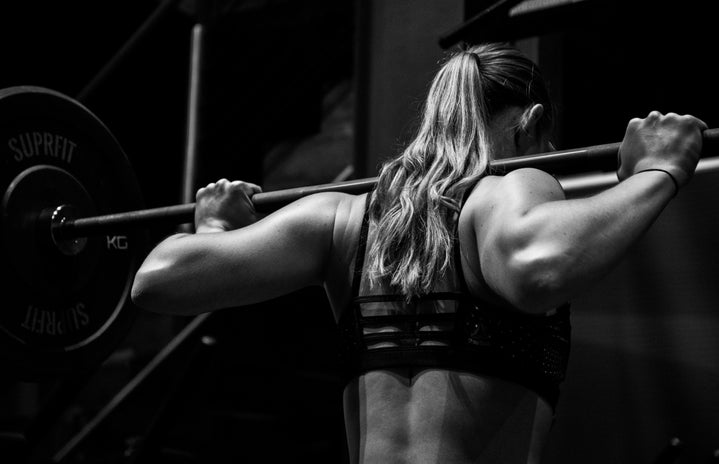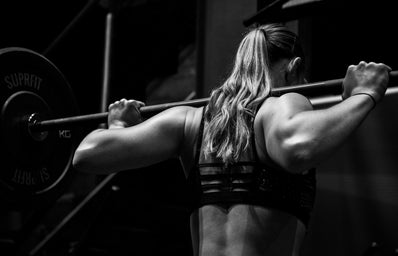4:45 AM was how early I would get up in the ninth grade. I wanted to be able to spend at least an hour and a half on the treadmill before class at 8 AM. Every morning I would pry myself out of my warm bed to work out before school. I was 16, and my parents were so proud of me for taking control of my health. I was proud too. I was convinced that the hour and a half was going to make my day, not because I was starting my day out right or getting healthy, not because the rush of working out was going to make me feel so energetic and focused the rest of the day, but because I was convinced that by the time I was done, my thighs would be just a little bit smaller. What my parents didn’t realize was that my motivation was not coming from a place of care or compassion for my body but from my hatred of it.
I wish I could say that this was a phase I snapped out of, but unfortunately, it was a mindset that I carried for years. I’ve only recently begun to realize just how harmful it really was. So much of exercise is focused on the idea of losing weight. Even with the body positivity movement having grown so much in the last few years, exercise is still treated as means to this specific end. Women especially are constantly confronted with the idea that exercise is a tool to reduce yourself. Slim your thighs, tone your stomach, lose the weight. Whereas, for men, the focus with exercise is often growing your size, gaining muscle and increasing overall mass. I never realized that as a woman, my focus on exercise did not have to come from a place of wanting to be smaller, and once I changed that mindset, my exercise became increasingly more fulfilling.
It started by asking myself a simple question: Why was I about to go work out? Too many times the reason behind my motivation came from a place of self-hate. My thighs have too much cellulite. My stomach isn’t flat enough. Once I lose the weight, I’ll be attractive— that was a big one for me. I allowed other people to dictate how confident I could be that day based on how I looked. On days I felt smaller I was over the moon, and on my bigger days, I didn’t want to leave the house. Mind you that at that point I was so obsessed with every crevice, shadow, and line on my body that I could hardly tell the difference anymore. My own perspective of my body had become so skewed that I was actually at a perfectly normal weight, even on the thinner side at times, but had no idea. If I hadn’t worked out that day, then in my head told me that I had instantly gained all the weight back. Forcing myself to confront the reasoning behind my actions was not easy, but it was what made me recognize this distorted way of thinking.

I started thinking of possible other reasons to exercise because in my head there were none. I even took some time away from exercising altogether until I could find a reason to work out that was completely separate from my weight. Honestly, that was one of the best things I’ve ever done for my health, both physically and mentally. I realized that I loved running outside on the trail because I loved the smell of the crisp fall air or feeling the summer sun on my skin. I loved that every time I could run just a little farther than the last, the joy in my progress adding to the high of the endorphins. I also stopped doing exercises that I didn’t enjoy just because they would improve my health. High Intensity Interval Training (or HIIT) is something that I used to practice a lot because there are numerous benefits of it, not just for weight loss. Although I had started to do HIIT for the right reasons, I have a health condition that makes it very easy for my heart to race, get lightheaded, or pass out, and with HIIT I found that the quick-changing pace often aggravated these symptoms. Initially, I felt that stopping HIIT would be quitting, but then I accepted that it was better for me physically, meaning it was healthier for me to do other forms of cardio that were not only easier on my condition but that I actually enjoyed doing. That’s when I started lifting.
There is such a stigma surrounding women lifting heavy weights— that we’ll get bulky or masculine— but in reality, women don’t actually produce enough testosterone to bulk up as men do. The results for us are more toned muscles, faster metabolism, and increased strength. Personally, I lift because it makes me feel strong, capable, and powerful, which is an attitude that I carry over into my everyday life. But there are so many other forms of exercise out there: yoga, biking, hiking, even Zumba. No matter what it is, finding a form of exercise that makes you feel strong, capable, and powerful is one of the first steps to change your focus on how much weight you can lose to how much your health can improve.
It has been a very long journey with many ups and downs, but reevaluating my own motivation and focusing on improving my strength and endurance has become my welcome alternative to using exercise as a way to improve my body instead of punishing it. If I happen to lose some weight in the process, that is simply a side effect to the goal of becoming a stronger, healthier person. The most important thing to remember is to exercise because you love your body, not because you hate it. Your body is your home. Rather than try and shrink it, why not focus on growing your strengths, improving your mindset, and working towards becoming physically and mentally healthier?




